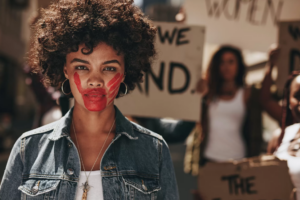What Can the 2022 Elections Tell Us About Violence Against Women

With the vicious attack on the husband of the Speaker of the House of Representatives, Nancy Pelosi, the neck-and-neck finishes in dozens of US congressional and other races, and the general anxiety that accompanied the first national election in the United States since the January 6 insurrection, it is not surprising that the US midterms seized the attention of the world. However, the November 8 elections in the US were actually the 75th national elections to take place in 2022 in the world. And while these elections — from Brazil to Kenya to Papua New Guinea — involved a diversity of political processes and systems, one bleak point of commonality was persistent: violence against women seeking or holding elected office.
These events underscore why the International Day for the Elimination of Violence Against Women is such an important date. This date, November 25, serves as the first of 16 days that focuses on the elimination of gender-based violence, an annual campaign that runs until International Human Rights Day on December 10th. Violence against women is a global epidemic. Elections have prompted outbreaks of violence targeting women voters, poll workers, election officials, and candidates with devastating effects on the individuals and incalculable costs to women’s participation in political and electoral processes.
Brazil, Kenya and Papua New Guinea
In Brazil, violence against women candidates and public figures were features of the October elections despite a new law specifically addressing violence against women in politics. President Jair Bolsonaro, who is notorious for misogynistic remarks, verbally attacked a woman journalist moderating the first debate, which spurred additional online abuse and hate speech against her from his supporters on social media. However, violence against women candidates and public figures extended well beyond Bolsonaro’s comments, especially targeting transwomen, women of color, and women candidates affiliated with left or center-left parties.
In Kenya, electoral violence marred elections in 2007 and again in 2017. Thousands of women and girls were victims of sexual violence in the wake of both elections, often at the hands of police or security forces. While the 2022 elections were largely peaceful, women candidates were still targeted for violence and threats during the campaign and electoral period. One aspirant for county assembly was physically attacked by her opponents when attempting to vote in her party’s primary. The Kenya Women’s Parliamentary Association documented dozens of other physical attacks against women candidates.
Fewer than 5 percent of candidates standing for the 2022 legislative elections in Papua New Guinea – one of a handful of countries in the world without any women in parliament – were women. In addition, dozens of people were murdered during a violent and chaotic electoral period, and more than 90,000 people were displaced in election-related violence with women and children most affected. When the votes were finally tallied, two women (and 116 men) were elected as MPs.
The United States
Finally, we turn to the United States, where a man broke into the home of Speaker Nancy Pelosi just days before the election, ultimately injuring her husband. Pelosi, one of the most powerful political leaders in the United States, made clear that the attack on her family would impact her decision about whether she would remain in a leadership role, and ultimately announced that she will not seek a leadership position in the 118th Congress.
There were few other reported instances of physical violence against women politicians and their families during this US election, despite a surge in threats, including from their own colleagues. But the effects of threats, hate speech, and other incidents of psychological violence, online and off, are nonetheless devastating both to the women who are targeted and the countless others who witness the attacks. And in the United States, as in Brazil, women of color are disproportionately targeted for online abuse.